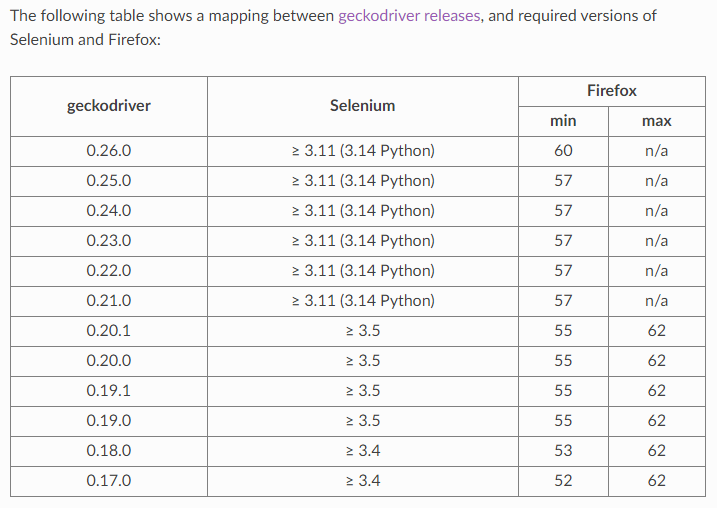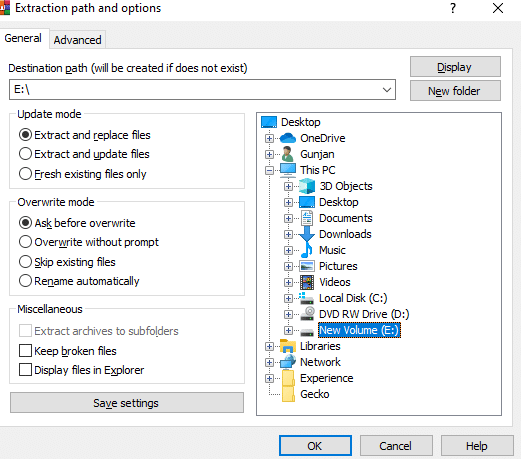GeckoDriver - Selenium WebDriver for Firefox Automation
geckodriver is a crucial WebDriver implementation for Mozilla Firefox, designed to interface with Gecko-based browsers. It adheres to the W3C WebDriver standard, providing a robust HTTP API to communicate effectively with Firefox. This modern tool replaces the outdated FirefoxDriver, offering enhanced compatibility with the multi-processing architecture introduced in Firefox 47.
geckodriver is a key component in the WebDriver framework, specifically designed to interact with Gecko-based browsers like Mozilla Firefox. It acts as a bridge between WebDriver clients and the Firefox browser, translating WebDriver commands into the Marionette protocol used by Firefox. This allows automated testing tools and scripts to control a nd interact with Firefox in a standardized way.This is vital for developers and testers who rely on consistent and reliable automation across different browsers. By implementing the latest WebDriver standards, geckodriver helps in maintaining up-to-date compatibility and features with Firefox.
nd interact with Firefox in a standardized way.This is vital for developers and testers who rely on consistent and reliable automation across different browsers. By implementing the latest WebDriver standards, geckodriver helps in maintaining up-to-date compatibility and features with Firefox.
Key Features

WebDriver Protocol
geckodriver is designed to comply with the W3C WebDriver standard, which is the modern specification for browser automation.

HTTP API
geckodriver implements an HTTP API based on the WebDriver protocol. This API defines how WebDriver commands are communicated between the client and the browser.

Protocol Translation
Internally, geckodriver translates WebDriver commands into the Marionette protocol. Marionette is Mozilla’s automation protocol used by Firefox.

Proxy Functionality
geckodriver acts as a proxy server between the WebDriver client and the Gecko browser. It handles requests from the client, processes them, and communicates with the browser.
Compatibility and Requirements
When working with geckodriver, understanding its compatibility and requirements is essential for a smooth setup and operation. This section covers the necessary Selenium version, supported browser versions, and operating system compatibility.

Selenium Version Requirements
geckodriver is designed to work with specific versions of Selenium, as it adheres to the W3C WebDriver standard, which introduced new protocols not supported by older Selenium versions. Therefore, to avoid compatibility issues and to leverage the full functionality of geckodriver, it is important to ensure that your Selenium setup meets the following requirements
Minimum Version of Selenium Needed
The minimum required version of Selenium to use geckodriver is Selenium 3.11. Versions of Selenium prior to 3.11 use an older protocol that is not compatible with geckodriver. Upgrading to at least version 3.11 ensures that your Selenium setup can communicate effectively with geckodriver.

Supported Versions of Firefox
geckodriver supports Firefox versions from Firefox 48 onward. This is because Firefox 47 and earlier versions do not support the new multi-processing architecture (also known as Electrolysis or e10s) and are incompatible with geckodriver.
For the best performance and access to the latest features, it’s recommended to use the most recent version of Firefox that is compatible with geckodriver.
Operating System Support
geckodriver is cross-platform and supports the major operating systems:
- Windows: Compatible with Windows 7, 8, 8.1, 10, and later versions.
- macOS: Supports macOS 10.9 (Mavericks) and later versions.
- Linux: Works on most Linux distributions, but specific compatibility may vary based on the distribution and its dependencies.
It’s important to ensure that your operating system is up to date and that you have the necessary drivers installed for geckodriver to function correctly.
Setting Up and Configuring geckodriver
Setting up geckodriver is an essential step for automating tests or browser interactions with Firefox through Selenium. Here’s a detailed explanation of the process:
Installation Process
Download geckodriver:
- Visit the official geckodriver releases page on GitHub.
- Choose the appropriate version for your operating system (Windows, macOS, or Linux).
- Download the compressed file (e.g., .zip for Windows, .tar.gz for Linux/macOS).
Extract the File:
- Extract the downloaded file to a desired location on your computer.
- The extracted folder will contain the geckodriver executable.
Move the Executable (Optional):
- For easier access, you may move the geckodriver executable to a directory that is included in your system’s PATH environment variable (e.g., /usr/local/bin on macOS/Linux or C:\Windows\System32 on Windows).
Configuration Steps
To ensure that your system can locate geckodriver when it’s needed, you may need to set up environment variables:
Windows:
- Right-click on “This PC” or “Computer” on your desktop or in File Explorer and select “Properties.”
- Click on “Advanced system settings” and then “Environment Variables.”
- Under “System variables,” find the Path variable, select it, and click “Edit.”
- Add the path to the directory where geckodriver.exe is located. Separate it from existing entries with a semicolon.
- Click “OK” to save your changes.
macOS/Linux:
- Open a terminal.
- Edit your shell profile file (e.g., ~/.bash_profile, ~/.bashrc, or ~/.zshrc), depending on the shell you are using.
- Add the following line: export PATH=$PATH:/path/to/geckodriver
- Replace /path/to/geckodriver with the actual path to the geckodriver executable.
- Save the file and run source ~/.bash_profile (or the respective file) to apply the changes immediately.
Write a Basic Selenium Script
Run the Script:
Run your script in the terminal or command prompt. If everything is set up correctly, Firefox should open and navigate to the specified URL.
Adjust Driver Options (Optional):
You can customize the behavior of geckodriver through various Firefox options and capabilities:
Licensing and Source Code
Mozilla Public License Information
The geckodriver project is open-source and is made available under the Mozilla Public License (MPL). The MPL is a free and open-source software license developed by the Mozilla Foundation. It is a weak copyleft license, meaning that while the code licensed under MPL can be freely used, modified, and distributed, any changes made to the source code must also be released under the same MPL license. This ensures that the community can benefit from improvements and that the project remains open and collaborative.
Accessing and Contributing to Source Code
The source code for geckodriver is publicly accessible, allowing developers to explore, contribute, or modify the code according to their needs.
- Accessing the Code: The source code is hosted in Mozilla’s central repository, known as mozilla-central. Developers can clone the repository, review the code, and make modifications.
- Contributing: Contributions to the geckodriver project are welcomed. Developers can contribute by:
- Forking the repository.
- Making changes or adding new features.
- Submitting pull requests for review.

Mozilla also encourages contributors to participate in discussions and file issues or bug reports, making it a collaborative environment where improvements are continuously integrated.
Repository Location
The geckodriver source code is part of the broader Mozilla codebase and is located within the mozilla-central repository. This repository contains the code for many Mozilla projects, including the Firefox browser itself.
- Repository Path: Within mozilla-central, the geckodriver code can be found under the directory path testing/geckodriver.
- Navigation: Developers can navigate to this directory to find the specific files and documentation related to geckodriver.
- Building from Source: Instructions for building geckodriver from source can usually be found in the repository’s documentation, allowing developers to compile their custom versions if needed.
The mozilla-central repository is an essential resource for anyone interested in contributing to or understanding the development of geckodriver and other Mozilla projects.
FAQ's
geckodriver primarily supports Mozilla Firefox and other Gecko-based browsers.
You can install geckodriver by downloading it from the official GitHub releases page or through package managers like brew on macOS. Extract the downloaded file and add it to your system’s PATH.
Set up geckodriver with Selenium by specifying the path to the geckodriver executable in your WebDriver script or by placing it in your system’s PATH.
geckodriver implements the W3C WebDriver standard, while the older FirefoxDriver used the Selenium wire protocol. geckodriver is more modern and supports the latest features of Firefox.
Yes, geckodriver is open-source and is licensed under the Mozilla Public License.
The source code for geckodriver is available in the mozilla-central repository under the directory testing/geckodriver.
You can contribute to geckodriver by forking the repository, making changes, and submitting a pull request according to the contribution guidelines.
geckodriver supports Windows, macOS, and Linux operating systems.
Update geckodriver by downloading the latest version from the official GitHub releases page and replacing the old executable in your system.
Yes, geckodriver can be used with Python’s Selenium library to automate Firefox.
The Marionette protocol is the communication protocol used by geckodriver to control Firefox, translating WebDriver commands into actions within the browser.
You can specify the path to geckodriver in Selenium by setting the webdriver.gecko.driver system property in your script.
Yes, geckodriver supports headless mode in Firefox, allowing you to run tests without opening a browser window.
You need geckodriver to automate tests and browser interactions with Firefox using WebDriver-compatible clients like Selenium.
Ensure that the geckodriver executable is placed in a directory that is included in your system’s PATH environment variable.
Yes, geckodriver can be used on a remote server for distributed testing, but ensure that the remote server has Firefox installed.
Common issues can be troubleshot by checking error messages, ensuring compatibility between versions, and verifying that geckodriver is correctly installed and configured.
geckodriver is designed to work with the latest versions of Firefox, but occasionally you may need to update geckodriver to maintain compatibility.
In Selenium Grid, geckodriver acts as the WebDriver implementation for Firefox nodes, allowing tests to run on multiple machines.
No, if you are using WebDriver with Firefox, geckodriver is required as it implements the necessary protocol for controlling the browser.
geckodriver is for Firefox and other Gecko-based browsers, while chromedriver is for Google Chrome. Each driver interfaces with its respective browser’s automation protocol.
Using an outdated version of geckodriver can lead to compatibility issues, errors, or missing features when interacting with newer versions of Firefox.
Yes, geckodriver supports the installation and testing of Firefox extensions through WebDriver scripts.
Automated tests can be run with geckodriver by writing WebDriver scripts in languages like Python, Java, or JavaScript, which interact with Firefox through geckodriver.
Yes, geckodriver can be integrated into CI/CD pipelines to run automated browser tests as part of the development and deployment process.
To run Firefox in headless mode, add the -headless argument to the Firefox options in your WebDriver script.
Schema
GeckoDriver - Selenium WebDriver for Firefox Automation

GeckoDriver is a WebDriver for Firefox, enabling Selenium tests to interact with the Firefox browser, available for Windows, macOS, and Linux. #GeckoDriver
Price: Free
Price Currency: $
Operating System: Windows 7, 8, 8.1, 10, or 11
Application Category: Softwate
4.7
